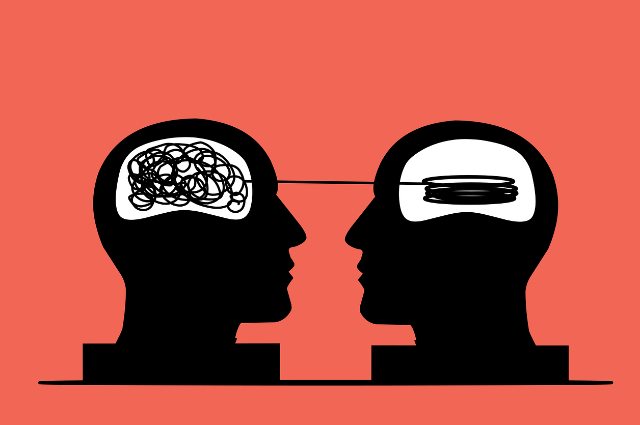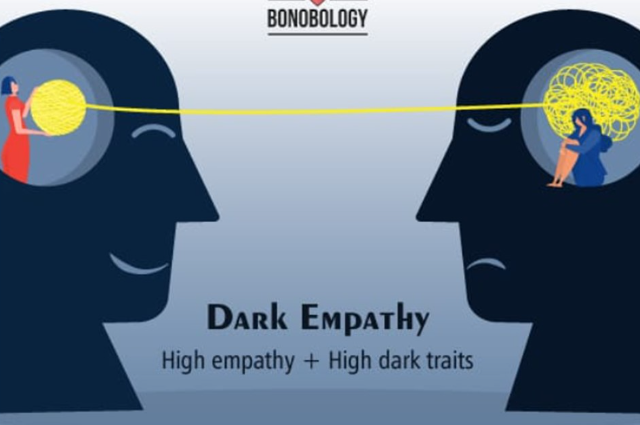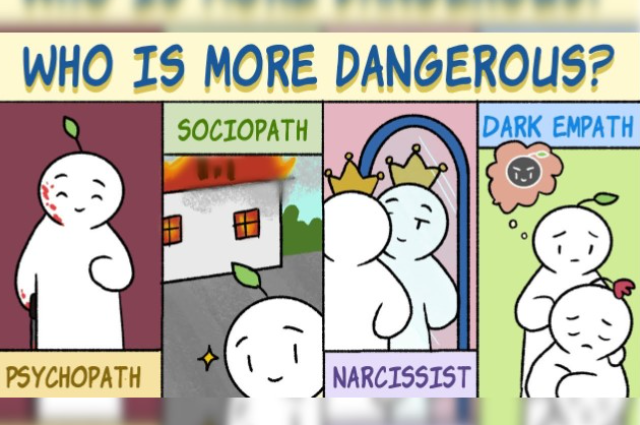I have always been fascinated and intrigued by the limitless potential humans hold, which propels us on the path of progression. The odyssey of transforming primitiveness into a touch of modernism is the beauty of the prowess of the human mind. In the vast and complex tapestry that constitutes human relationships, the delicate interplay between these contrasting forces often presents itself as an enigma. Have you ever experienced the captivating yet perplexing dynamics between light and shadow, empathy and narcissism? Within this intricate landscape, dark empaths and narcissists stand out as compelling and enigmatic figures, each characterized by a distinct array of traits and behaviours. On the other hand, susceptible people (HSP), recognized for their deep emotional awareness and sensitivity to the feelings of others, often find themselves traversing the challenging terrain of relationships with these fascinating, yet sometimes troubling, personalities. This journey can be both enlightening and bewildering, as HSPs strive to understand and navigate the emotional landscapes shaped by the contrasting influences of empathy and narcissism.
Exploration of the psychological underpinnings of Dark Empaths-
By dissecting the enigma of the Dark Empath, we hope to shed light on their complex nature and the impact they have on those around them, ultimately providing a deeper understanding of this intriguing and multifaceted personality type. Picture a scenario where you encounter an individual who seems to intuitively understand your emotions, yet maintains a certain distance, never truly engaging in the experience alongside you. Welcome to the intriguing realm of dark empaths—individuals who possess a remarkable ability to mimic empathy without the accompanying feelings of genuine compassion or the inclination to offer meaningful support.
A compelling illustration of this complex phenomenon can be found in Alanna's journey. At first, she felt utterly inundated by the emotional tides around her, but within that chaos, she unearthed a unique and transformative strength lurking in the shadows. Instead of falling prey to the manipulative tendencies often associated with dark empathy, Alanna embarked on a path of self-discovery where she learned to channel her empathic abilities sincerely and authentically. Her experience serves as a powerful testament to both the challenges and victories that can emerge in the intricate landscape of dark empathy.
Narcissistic Personality - An epitome of self-absorption
At the opposite end of the emotional spectrum lies the narcissist—individuals who epitomize self-absorption and exhibit a striking lack of authentic empathy for others. Identifying a narcissist requires a keen understanding of the distinctive characteristics that differentiate them from their darker empath counterparts, who may also be self-serving but operate from a different emotional framework. In essence, the path to liberation from a narcissistic relationship is as much about personal growth as it is about breaking free from toxic influences. It requires a reawakening of one’s inner strength and resilience, allowing individuals to reclaim their narrative and prioritize their mental well-being. Ultimately, this journey can lead to a more authentic, fulfilling life where genuine connections are possible, free from the shadows of self-centeredness that define narcissistic interactions.
Escaping the intricate web spun by a narcissist resembles the task of untangling a complicated dance. This process necessitates a deep level of introspection, a commitment to cultivating self-love, and the bravery to set and uphold healthy boundaries in relationships. Undertaking this journey is rarely straightforward; it is often riddled with psychological hurdles that challenge one's sense of identity and emotional stability. Individuals must embark on a transformative quest to redefine their self-worth, often in the face of societal pressures and expectations that can cloud their judgment and exacerbate feelings of inadequacy.
As one navigates this challenging terrain, it becomes essential to recognize the importance of asserting personal boundaries, which serve as protective barriers against the manipulative tendencies of narcissistic individuals. Building self-esteem and fostering a sense of self outside of the validation sought by narcissists is crucial. This journey not only involves understanding the dynamics of narcissism but also embracing one’s own emotions and needs, which may have been neglected or suppressed in the past.
Drawing the lines between a Dark Empath and a Narcissist
Imagine a social gathering where a dark empath is present; they can create an enticing façade of compassion that draws people in and fosters an illusion of connection. Their responses may appear deeply understanding, leading others to believe they are in the company of a truly empathetic individual. Conversely, a narcissist in the same environment might redirect conversations toward themselves, striving for constant validation and admiration. They may dominate discussions, steering the narrative to reinforce their self-importance and satisfy their need for attention, often at the expense of others’ feelings. The key difference, however, lies in their emotional engagement and manipulation strategies.
Dark empaths possess an uncanny ability to understand and interpret the emotions of others without genuinely experiencing those feelings themselves. They can perceive the emotional landscape of a situation and respond in ways that seem empathetic, yet their understanding remains superficial. In contrast, narcissists often exploit emotional dynamics to further their agendas, wielding manipulation as a tool to fulfil their desires and goals. These contrasting approaches underscore the subtle yet significant differences in how dark empaths and narcissists engage with the people around them.
While both can be enchanting in their own right, their underlying motivations and emotional interactions reveal the distinct ways they relate to others, ultimately shaping their social dynamics and the impact they have on their relationships. Understanding these nuances is vital for recognizing and navigating the complexities of interpersonal relationships involving these two personality types. In the complex interplay between dark empaths and narcissists, it is essential to identify both the overlapping characteristics and the unique distinctions that set them apart. Both personality types frequently exhibit a captivating charm that can easily attract and engage those around them, which can make it particularly difficult to understand the true nature of their interactions
Identifying dark empaths and narcissists in real life

Image by Mohamed Hassan from Pixabay
These vivid scenarios highlight the different tactics employed by dark empaths and narcissists as they manoeuvre through social interactions. By becoming aware of these behavioural patterns, individuals can equip themselves with the knowledge necessary to navigate their relationships more effectively. This awareness is crucial in safeguarding oneself against potential emotional manipulation and fostering healthier interpersonal connections. Understanding these dynamics not only empowers individuals to recognize red flags but also enables them to respond strategically to maintain their emotional well-being. On the other hand, consider a narcissist in a similar group setting who adeptly takes control of conversations during moments of conflict resolution.
Instead of fostering an environment conducive to mutual understanding, this individual redirects discussions to revolve around their own needs, desires, and perspectives. They may invalidate others’ feelings and escalate tensions, ensuring that the focus remains solely on themselves and their grievances. Gaining a deeper understanding of dark empaths and narcissists involves delving into real-life examples where their distinct behaviours manifest clearly. Imagine a social gathering where a dark empath skillfully creates a façade of empathy, engaging with others and leaving them with the impression that they genuinely care about their feelings and experiences. This persona can be so convincing that individuals may feel a strong emotional connection, unaware that their interactions are part of a more calculated strategy.
The interrelationship between Dark Empaths and Narcissists
For instance- Gia's path to liberation was not merely a physical exit from the relationship; it was a profound, transformative journey that involved deep self-reflection and personal growth. As she navigated the complexities of her emotions, she began to uncover layers of her own identity that had long been overshadowed by the narcissist’s demands and needs. This process of self-discovery allowed Gia to reclaim her sense of self-worth and understand the importance of establishing healthy boundaries. Ultimately, her journey led her toward authentic love—one that was rooted in mutual respect, understanding, and emotional support. This evolution not only empowered Gia to seek healthier relationships in the future but also deepened her understanding of herself as an empath, highlighting the challenges and triumphs that often accompany such profound personal transformations.
The Detrimental Impact on Empaths
By gaining a deeper understanding of these impacts, individuals can empower themselves to navigate these challenging interpersonal dynamics with greater resilience and clarity. It’s crucial to remember that one does not have to face these struggles in isolation; seeking support from friends, family, or mental health professionals can provide invaluable assistance in this journey. Building a solid support system is key to overcoming the challenges posed by interactions with dark empaths or narcissists, ultimately leading to a more balanced and fulfilling life. In this context, developing empathic resilience becomes essential. This resilience is not a singular approach but rather a comprehensive strategy that encompasses various elements, including the establishment of clear boundaries, the prioritization of self-care, and the importance of seeking external support networks.
Each of these components plays a crucial role in helping empaths protect their emotional well-being while navigating the complex dynamics of their relationships. To illustrate, consider the journey of an empath who finds themselves entangled in a relationship with a dark empath or a narcissist. The emotional toll of such a relationship can be staggering, often resulting in feelings of confusion, self-doubt, and exhaustion. This necessitates a strong commitment to self-preservation and personal growth. Empaths must actively work to reclaim their sense of self and establish a healthier emotional landscape. For individuals who are highly sensitive or identify as empaths, engaging in relationships with dark empaths or narcissists can be an incredibly draining experience, both emotionally and psychologically. The very qualities that make empaths so appealing—such as their deep compassion, understanding, and ability to connect with others—often attract narcissistic personalities. These individuals tend to seek out empaths specifically for their capacity to provide validation and emotional support, ultimately leading to a toxic cycle characterized by manipulation and emotional fatigue.
Taking Up Genuineness
The takeaway from this examination of dark empaths versus narcissists is unmistakable: embrace authenticity. Acknowledge the shadows, move through them with fortitude, and escape negative relationships and social pressures.


